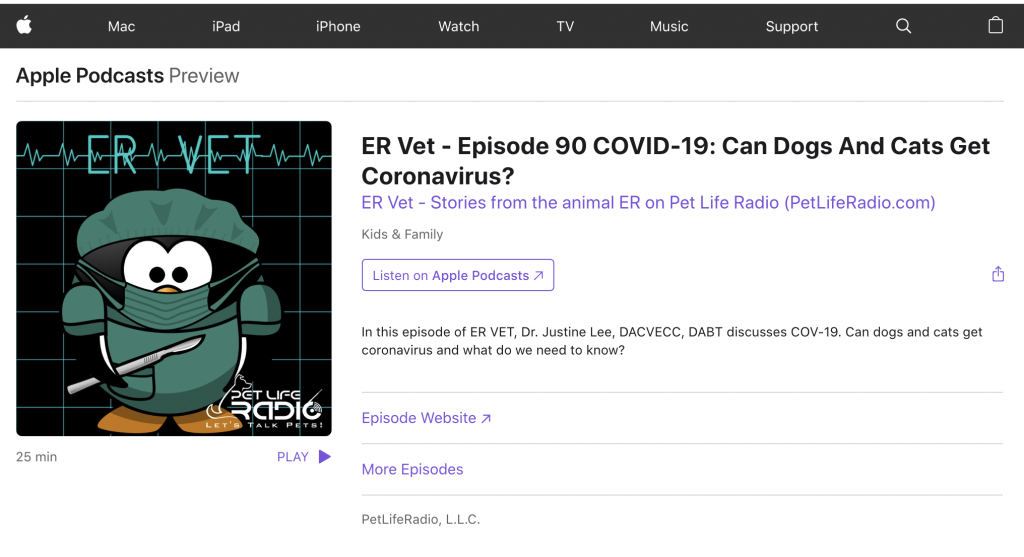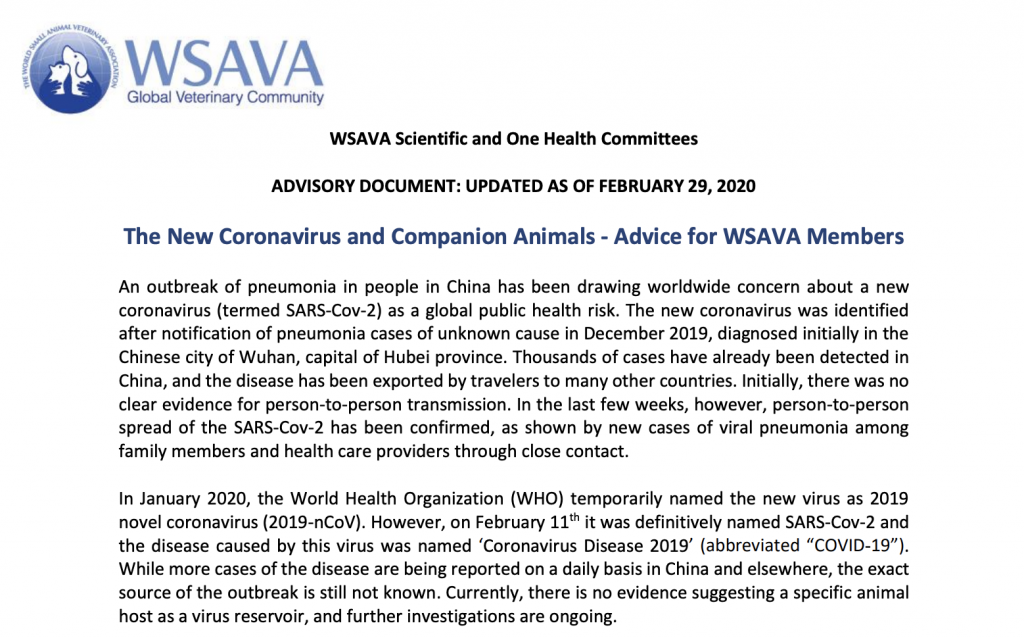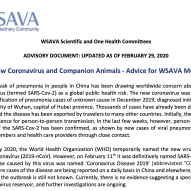Can my dog or cat get coronavirus COVID-19?
With all the concern about coronavirus now, I often get asked whether dogs or cats can get coronavirus or COVID-19. Prior to the COVID-19 outbreak, we veterinarians were really only familiar with the coronavirus in cats that causes severe, potentially life-threatening Feline Infectious Peritonitis. (You can read more about that here or listen to the podcast I did on this with Pet Life Radio on #ERVet. But this is a different type – specifically alpha-coronavirus.) In dogs, coronavirus typically just results in mild gastrointestinal signs (e.g., vomiting, diarrhea). These are different from the current COVID-19 outbreak.

While there was one dog in Hong Kong that tested weakly positive for COVID-19, it should be noted that the dog wasn’t showing ANY symptoms at all. It’s really unlikely that dogs can transmit or get COV-19 to or from humans. The dog lived with someone who did have COVID-19, and there’s concern of whether or not it was environmental contamination that resulted in the dog being positive. It still hasn’t been definitely proven there has been human-to-animal transmission based on this, but further testing and diagnostics are still pending.
So, what do you as a pet owner need to know? First, dogs and cats are much more likely to develop upper respiratory signs from other things. Dogs get Canine Infectious Respiratory Disease Complex (CIRD) which is due to different viruses (e.g., parainfluenza, dog flu H3N2/H3N8, etc.), and bacteria (e.g., Bordetella, Mycoplasma, Strep equi., etc.). There are some vaccines for these, and you should consult you veterinarian about these (I always recommend the vaccines for social dogs who go to dog parks, doggy daycare, groomers, dog shows, agility, etc.). For cats, upper respiratory infections from viruses (e.g., calicivirus, herpesvirus) are more common.
If you don’t live in a COVID-19 endemic area, there’s really little concern. If you do live in a COVID-19 endemic area, I’d try to keep your pets away from dog parks, doggy daycares, etc. where people may congregate too.
What about if YOU are symptomatic and positive for COVID-19? Then you need to use caution, but no need to try to fit a mask on your dog or cat.
WSAVA released some important updates here:
https://wsava.org/wp-content/uploads/2020/03/COVID-19_WSAVA-05.03-ENGLISH.pdf

The biggest takeaways?
If you’re positive for COVID-19, and you have no one you can care for your pets, then you should avoid snuggling, kissing, petting, or spending time with your pets. You should also wear a mask to prevent potentially exposure to your pets, and wash your hands thoroughly prior to and after feeding or caring for your pets. Make sure to keep your pets inside if possible. When in doubt, contact your veterinarian immediately if you have questions or concerns. That said, please don’t bring your dog or cat to the vet or ER vet without calling in advance. Don’t bring them anywhere to be safe! Unless your pet is showing clinical signs (e.g., having difficulty breathing, etc.), we don’t want you showing up to the veterinary clinic without advanced notice due to the risk of exposure to everyone else (2-legged and 4-legged).
The CDC specifically addresses this for pet owners with this statement:
“You should restrict contact with pets and other animals while you are sick with COVID-19, just like you would around other people. Although there have not been reports of pets or other animals becoming sick with COVID-19, it is still recommended that people sick with COVID-19 limit contact with animals until more information is known about the virus. When possible, have another member of your household care for your animals while you are sick. If you are sick with COVID-19, avoid contact with your pet, including petting, snuggling, being kissed or licked, and sharing food. If you must care for your pet or be around animals while you are sick, wash your hands before and after you interact with pets and wear a face mask.”
Keep in mind that this is an evolving disease, as we still don’t know a lot about COVID-19 in dogs and cats. That said, use CREDIBLE online sources for the most accurate, up-to-date information. Here are some great sites:
• World Health Organization (WHO)
• Centers for Disease Control and Prevention (CDC)
What about animal specific information about coronavirus or COVID-19? You can find great information at:
• World Organisation for Animal Health (OIE)
Most importantly, keep up to date to keep your pets safe, but realize that the risk is VERY low for them to get it. I’ll update this blog as further information develops, but in the meantime, wash your hands, be safe and take care!


It’s interesting that it seems since, that cats are more susceptible to illness than dogs. I would be concerned about sickening my dog so I have to keep myself from getting it for her sake. I am not as concerned about my dog giving it to me but I did initiate “no petting” policy for the time being.